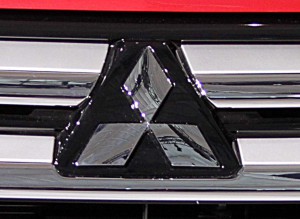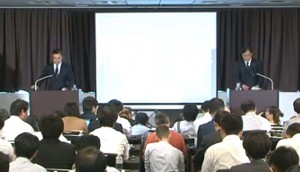
Mitsubishi President Tetsuo Aikawa tendered his resignation effective June 24, as the automaker struggles in the wake of its fuel economy reporting.
The fallout from the Mitsubishi fuel economy scandal spread to the Japanese automaker’s president, Tetsuo Aikawa, who is resigning from his job effective June 24. Executive Vice President Ryugo Nakao also resigned.
No successors have been named. Chairman Osamu Masuko survives, but is surrendering any compensation he earns until the company forms a new management team.
Aikawa offered up his job at a press conference today, but did not admit to any wrongdoing related to the issue. Earlier this month, officials confirmed that the fuel economy data for its vehicles in Japan were falsified.
The falsified results came as a result of intense pressure from senior executives to meet stringent fuel economy targets, which they ultimately could not meet. The automaker used “desktop calculations” to determine the fuel economy of models.
Additionally, the RVR sport utility vehicle wasn’t even tested, according to a company statement. The company continued using illegal methods because they led to results that deviated by about 2.3% or less.
The resignations come after Nissan, Japan’s second-largest automaker, took advantage of a financially weakened Mitsubishi and gobbled up a 34% stake – worth $2.2 billion – in the smaller automaker. In the immediate wake of the scandal, Mitsubishi’s stock price dropped nearly 50%. Mitsubishi is Japan’s ninth-largest automaker.
Media reports suggest that Nissan officials have been assured that they will have a significant role in the reshaping the company’s senior leadership profile. The automaker has acknowledged that false fuel economy figures may go back a quarter century and affect all the models in its Japanese lineup.
(GM halts sales of large crossovers to correct mileage numbers. For more, Click Here.)
Mitsubishi’s tale is just one of many that have come to light in recent months. In fact, Suzuki Motor Corp. apologized today for “discrepancies” between its testing results and regulatory performance numbers for new vehicles. It noted 16 affected models but said it had not uncovered any “manipulation” of data.
General Motors was slapped with a class-action suit in Southern California over misstated mileage ratings for its Chevrolet Traverse, Buick Enclave and GMC Acadia large crossovers. The automaker issued a stop-sale order on the 2016 models until it can issue new window stickers with the correct fuel economy ratings.
(Mitsubishi reveals it rigged mileage numbers on all Japanese models. Click Here for the story.)
However, Consumer Reports is suggesting that the incorrect numbers extend several years back on the vehicles. The suit claims that owners were economically harmed because they had to pay more for fuel as well as the possibilities that the resale value of their vehicles may drop.
However, the biggest story in the mix for falsified testing results belongs to Volkswagen. The German automaker dodged diesel emissions standards by using specialized software. In all, about 11 million vehicles worldwide have been part of the cover up.
(To see about automakers under fire for bending the truth, Click Here.)
In just the U.S. alone, VW is expected to shell out more than $9 billion to fix or replace the vehicles impacted by the scandal. Global numbers are expected to exceed more than $20 billion.

